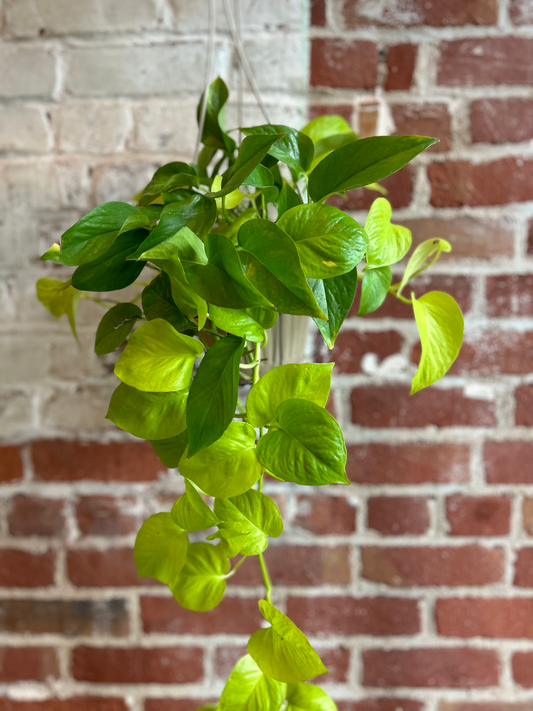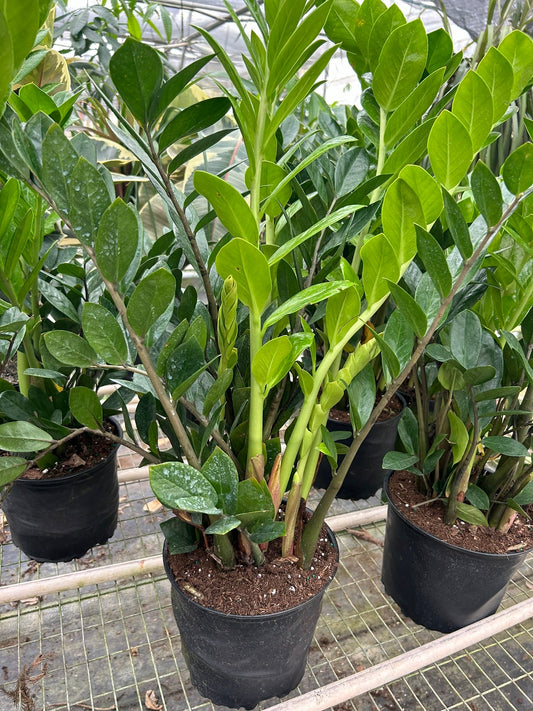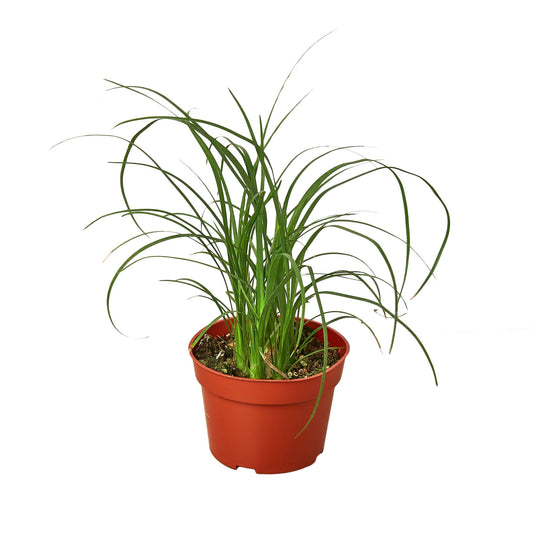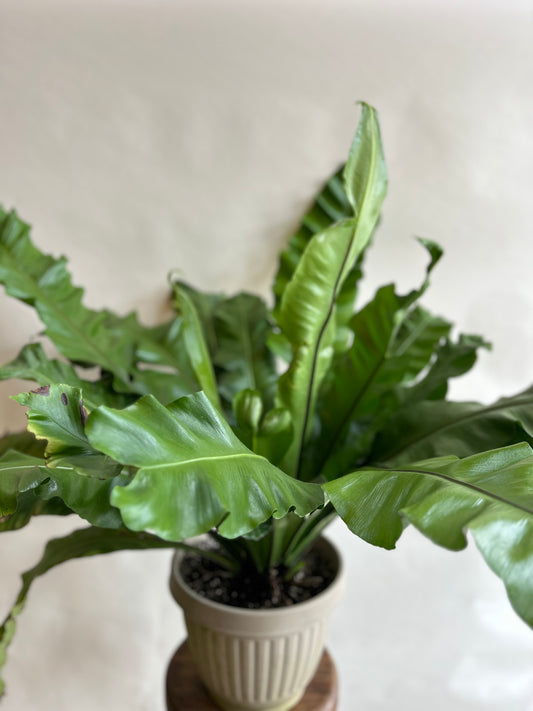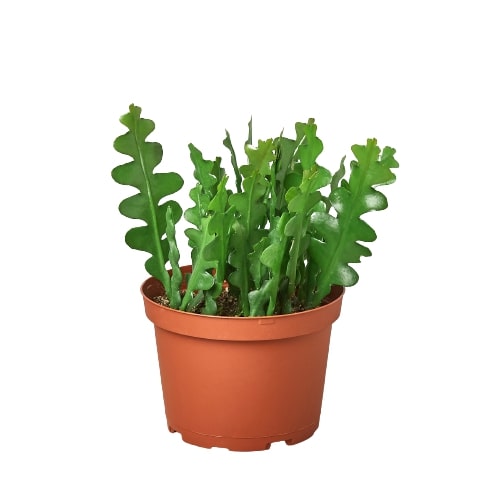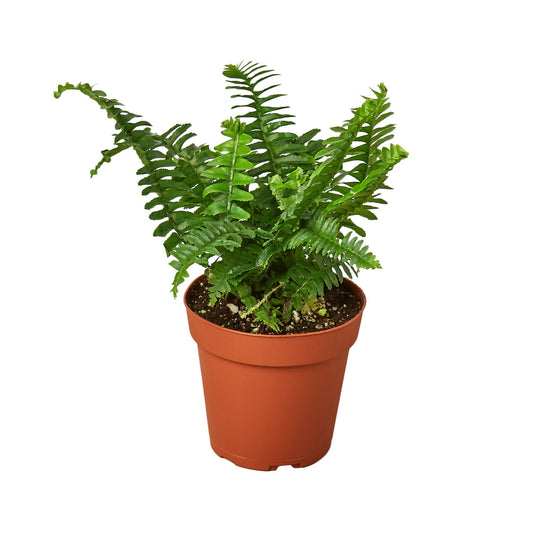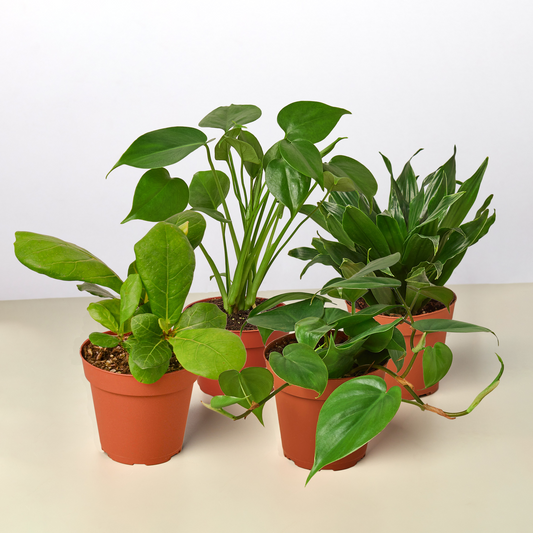Are ZZ Plants Toxic to Cats?
Cafe Planta Team
ZZ plants, with their glossy green leaves and low maintenance nature, have become popular houseplants among plant lovers. However, if you're a cat owner, you might be concerned about their safety around these curious creatures. Cats love to explore and sometimes nibble on plants, which raises the question: Are ZZ plants toxic to cats?
In this article, we'll explore the potential risks that ZZ plants pose to our feline friends, how to recognize symptoms of toxicity, and what to do if your cat ingests part of the plant. We'll also discuss alternative plants that are safe for pets, along with some tips for keeping your green companions out of harm's way.
Understanding ZZ Plants and Their Popularity
The ZZ plant, short for Zamioculcas zamiifolia, is a robust and attractive houseplant known for its ability to thrive on neglect. Originating from Eastern Africa, this plant has gained popularity due to its striking appearance and resilience. With their thick, waxy leaves, ZZ plants can survive in low-light conditions and require infrequent watering, making them perfect for busy individuals or beginner plant parents.
What makes the ZZ plant particularly appealing is its ability to purify the air, contributing to a healthier indoor environment. Their sculptural look fits well with modern and minimalist interior designs, adding a touch of green elegance to any space. But while they’re a favorite among plant enthusiasts, those with pets need to consider their potential toxicity.
Are ZZ Plants Toxic to Cats?
Yes, unfortunately, ZZ plants are toxic to cats. The plant contains calcium oxalate crystals, which are sharp, microscopic compounds. These crystals can cause irritation and discomfort if ingested or if they come into contact with skin. While the toxicity level is considered mild to moderate, it’s still something cat owners should be aware of.
When a cat chews on a ZZ plant, the calcium oxalate crystals can cause immediate irritation in the mouth and throat. This can lead to drooling, pawing at the mouth, and difficulty swallowing. In more severe cases, if a significant amount of the plant is consumed, it can lead to vomiting and other digestive issues. However, it’s worth noting that while these symptoms can be distressing, they are usually not life-threatening.
Recognizing Symptoms of ZZ Plant Toxicity in Cats
If you suspect your cat has nibbled on your ZZ plant, watch out for some tell-tale signs of irritation or distress. Symptoms may vary depending on the amount consumed, but common signs of ZZ plant toxicity include:
- Drooling: Excessive salivation can be one of the first indicators.
- Pawing at the mouth: Cats might try to relieve the discomfort by pawing at their face or mouth.
- Vomiting: Ingesting the plant may cause nausea and vomiting.
- Loss of appetite: Your cat might refuse to eat due to oral irritation.
- Swelling or redness around the mouth: The area may appear inflamed.
If you observe any of these symptoms, it’s a good idea to contact your veterinarian for advice. They can provide guidance on how to alleviate your cat's discomfort and determine if further medical attention is needed.
Steps to Take if Your Cat Ingests a ZZ Plant
Finding out your cat has chewed on a ZZ plant can be alarming, but don't panic. Here are some steps you can take to help your feline friend:
- Remove the Plant: Take away any part of the plant that your cat may have access to, preventing further ingestion.
- Rinse the Mouth: If possible, gently rinse your cat's mouth with water to help remove any residue from the plant.
- Monitor Symptoms: Keep an eye on your cat for any symptoms of irritation or distress.
- Contact a Veterinarian: Call your vet and explain what happened. They can advise on whether you need to bring your cat in for a check-up.
- Provide Comfort: Ensure your cat is comfortable and has access to fresh water.
While it’s important to act quickly, remember that the symptoms are generally not life-threatening. However, a professional's opinion is always beneficial to ensure your cat's well-being.
Alternatives to ZZ Plants for Pet Owners
For those who love plants but want to keep their furry friends safe, there are plenty of pet-friendly alternatives to consider. Here are a few beautiful options that are safe for cats:
- Spider Plant: Known for its easy care and air-purifying qualities, spider plants are non-toxic to cats and are a great choice for hanging baskets.
- Bamboo Palm: This plant adds a tropical vibe to your home and is safe for pets.
- Boston Fern: With its delicate fronds, the Boston Fern is a lovely, pet-safe plant that thrives in humid conditions.
- Areca Palm: Another tropical option, the Areca Palm is non-toxic and can grow quite large, making it a stunning focal point in any room.
- Calathea: These plants are known for their vibrant, patterned leaves and are safe for pets, adding a splash of color to your space.
Choosing pet-friendly plants doesn't mean sacrificing beauty or variety. With these options, you can create a lush, green environment without worrying about your cat's safety.
Tips for Keeping Plants Out of Reach
Even with non-toxic plants, it’s a good idea to keep them out of reach to prevent any accidental damage or mess. Here are some strategies to keep your plants safe from curious paws:
- Use Hanging Baskets: Elevate plants by placing them in hanging baskets or on high shelves.
- Create a Plant Shelf: Install shelves specifically for your plants in areas your cat can’t access.
- Choose Tall Plants: Opt for taller plants or trees that cats are less likely to reach.
- Utilize Plant Stands: Raise plants off the ground with decorative stands.
- Train Your Cat: Gently train your cat to avoid certain areas using pet-safe deterrents or training techniques.
By incorporating these methods, you can ensure your plants remain intact and your pets stay safe, allowing for harmonious coexistence in your home.
Creating a Pet-Friendly Plant Space
Designing a pet-friendly plant space doesn't have to be challenging. With some thoughtful planning, you can create a home that's both stylish and safe for your furry companions. Consider these ideas:
- Designate a Plant Room: If possible, allocate a specific room for your plants where pets are not allowed.
- Use Barriers: Set up barriers or use baby gates to keep pets away from plant areas.
- Incorporate Vertical Gardens: Use wall-mounted planters to keep greenery out of reach.
- Mix Real and Fake Plants: Combine real plants with high-quality artificial ones to reduce the number of potentially harmful plants.
- Research Plant Safety: Always research a plant's safety before introducing it into a home with pets.
With these adjustments, you can enjoy the beauty of plants while ensuring your cats can explore safely.
Balancing Plant Passion with Pet Safety
Being both a plant lover and a pet owner can sometimes feel like a balancing act, but it’s entirely possible to create a home that accommodates both. By being mindful of plant choices and placement, you can indulge in your passion for greenery while ensuring the safety and well-being of your feline friends.
Remember, the goal is to create a harmonious environment where both plants and pets can thrive. With a little creativity and planning, you can have the best of both worlds, enjoying a vibrant and pet-friendly home.
Seeking Professional Advice
If you're ever in doubt about the safety of a particular plant around your pets, don't hesitate to reach out to professionals. Veterinarians and plant experts can provide valuable insights into which plants are safe and how to handle any potential issues.
Additionally, there are online resources and communities of pet owners and plant lovers who can offer support and share experiences. Engaging with these communities can provide reassurance and helpful tips for maintaining a safe and beautiful home.
Final Thoughts
ZZ plants are indeed toxic to cats, but with careful planning and consideration, you can still enjoy a lush indoor garden without compromising your pet's safety. By choosing pet-friendly plants and employing smart placement strategies, you can create a beautiful, harmonious living space.
At Cafe Planta, we're passionate about helping you care for your plants and create stunning, pet-safe spaces. If you have any questions or need advice on plant care, feel free to email us or send us a message on Instagram. Whether you're a seasoned plant parent or just starting out, we're excited to be part of your plant journey.


